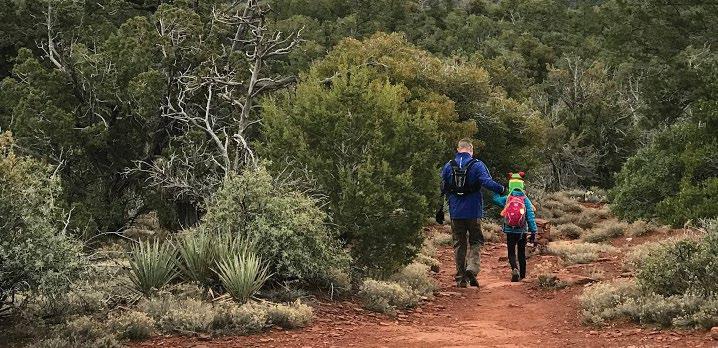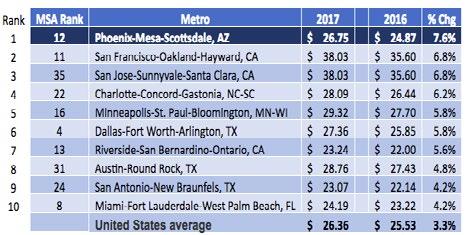4 • October 2017 •
CITY NEWS
FEWER FATAL OPIOID OVERDOSES IN STATES
WITH LEGALIZED MEDICAL MARJUANA ACCORDING TO THE AMERICAN ACADEMY OF PAIN MEDICINE, MORE THAN 100 MILLION AMERICANS SUFFER FROM CHRONIC PAIN. In an effort to relieve that constant pain, the number of opiate prescriptions has nearly doubled over the last decade. Today,
“
medical marijuana might be the key. Over the past two decades, deaths from drug overdoses have become the leading cause of injury death in the United States. In 2011, 55 percent of drug overdose deaths were related to prescription medications; 75 percent
Medical marijuana is safely helping over 100,000 patients treat their pain in Arizona, and cannot be overlooked as a viable solution to the opioid epidemic.
opiates like hydrocodone, oxycodone, and morphine flood the streets, driving up addiction rates and fatal opiate overdoses. The Centers for Disease Control and Prevention has officially labeled the problem an “opiate epidemic.” As experts scramble to come up with a plan that combats the nation’s dependence on opiates, a new study published last week in the journal JAMA Internal Medicine indicates
”
of those deaths involved opiate painkillers. However, researchers found that opiate-related deaths decreased by approximately 33 percent in 13 states in the following six years after medical marijuana was legalized. Researchers looked at medical marijuana laws and death certificate data in all 50 states between the years of 1999 and 2010. During that time, only 13 states had medical marijuana laws in place. Researchers quickly
noticed that the rates of fatal opioid overdoses were significantly lower in states that had legalized medical marijuana. In 2010 alone, states with legalized medical marijuana saw approximately 1,700 fewer opiaterelated overdose deaths. “We found there was about a 25 percent lower rate of prescription painkiller overdose deaths on average after implementation of a medical marijuana law,” lead study author Dr. Marcus Bachhuber said. About 60 percent of the nation’s fatal opioid overdoses occur among patients who have legitimate prescriptions for their medications. In states where medical marijuana is legal, however, a legitimate opiate user is able to significantly decrease his or her dosage, making overdose less likely. Currently, 23 states and the District of Columbia have passed medical marijuana laws. Use of medicinal cannabis is approved for a number of conditions, including cancer, HIV, multiple sclerosis, and glaucoma. Despite the diagnosis, medical marijuana is primarily used to relieve chronic or severe pain. It’s that pain-
relieving effect that decreases the number of fatal opioid overdoses. Bill Brothers is President of Encanto Dispensary, one of Arizona’s largest distributors of Medical Cannabis providing over 150 varieties for the benefit of its patients. “According to the Arizona Department of Health, our state has recorded thousands of opioid overdoses and nearly 300 related deaths just since June of this year,” said Brothers. “Medical marijuana is safely helping over 100,000 patients treat their pain in Arizona, and cannot be overlooked as a viable solution to the opioid epidemic. “Evidence from other states clearly show a 25 percent reduction in opioid use in states with a legal Medical Marijuana Program. The important goal for Arizona should be to reduce the cost of patients’ annual fees from $150 per year to $15 per year, allowing thousands more Arizonians to have access to their legal medicine through the state program without bearing an undue financial burden. What other legal drug requires you to pay the state $150 to have access to your medicine? None that I know of.”
PHOENIX WAGE GROWTH STRONGEST IN U.S. IN YET ANOTHER SIGN OF STRONG ECONOMIC MOMENTUM AND GROWTH IN QUALITY JOBS, THE PHOENIX METRO AREA EXPERIENCED THE HIGHEST WAGE GROWTH IN THE NATION OVER THE PAST YEAR. Wages in the Valley jumped 7.6 percent between July 2016 and July 2017, according to the U.S. Bureau of Labor Statistics.
Here’s a closer look at the numbers: Top 10 metros by increase in average hourly wage, July 2017 over July 2016 “MSA Rank” is based on July 2016 metropolitan statistical area population by the U.S. Census; “Rank” means percent change in average hourly wage yearover-year
“We’ve been laser focused on building a more innovation-driven economy that works for everyone, and we’re seeing great results,” Mayor Greg Stanton said. “This significant private-sector wage growth is being driven by advanced industries like technology, biosciences, healthcare, financial services and precision manufacturing.” The average hourly wage grew by nearly $2 an hour over the past year in the Phoenix metro area and is now $26.75, 1.5 percent higher than the national average of $26.36. Overall, the Phoenix metro area ranks 23rd in wages, but it’s quickly heading in the right direction. Before the Great Recession in 2007, advanced industries accounted for less than half of the workforce in Phoenix (46 percent). Now those higher-talent, higher-wage jobs make up more than 60 percent of the Valley’s workforce.
Source: U.S. Bureau of Labor Statistics
HYPER LOCAL NEWS FOR THE PHOENIX NORTH VALLEY / northtatumtimes.com







